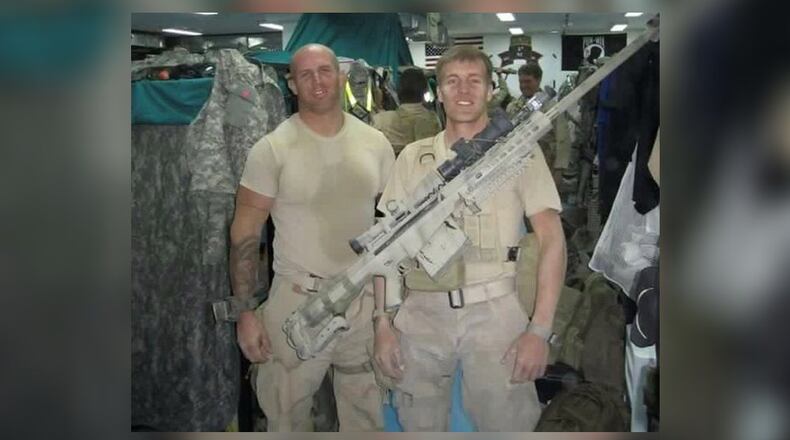»»READ: Navistar launches new truck assembled in Springfield
Its been 15 years since the 2003 invasion of Iraq and more than 17 years since the 9/11 attacks that led to the United State’s battles in Afghanistan and some remain critical of this country’s involvement.
Today is the 100th anniversary of the Nov. 11, 1918 armistice that ended fighting in World War I and what led to Veterans Day. As the milestone approached, vets of America’s most recent conflicts told the Springfield News-Sun about how they dealt with the fallout of coming home from wars that have become controversial over time.
“For the most part, my friends and family have been a big part of my recovery,” Clark County veteran Jared Lucas said.
Lucas was a sniper in the U.S. Army and served in both Iraq and Afghanistan. He was injured during combat on Veterans Day 2010. He was honorably discharged in 2012.
“My wife has been a big part of my healing,” Lucas said. “As far as support, the Columbus Vet Center has been very helpful.”
CRIME UPDATE: Springfield man arrested in connection to Sunoco shooting with child nearby
The most recent Iraq war, in particular, has come under scrutiny from politicians and high-profile people in the U.S. During the 2016 presidential election, then-candidate Donald Trump said the 2003 invasion was “the single worst decision ever made” while Democrat Hillary Clinton said voting in favor of military action in Iraq was a “mistake.”
Lucas said he doesn’t believe going into the Middle East was a mistake.
“It’s bad that we had to go over there, we lost a lot of guys and I lost a lot of friends,” Lucas said. “But it kind of needed to be done. It’s better to fight over there and than fight here.”
Lucas began coaching high school football after returning home and encourages anyone thinking about joining to do so.
“I think it’s the best thing they can do,” he said. “I want to push my kids to do it. It sets you up for life. It gives you a whole new appreciation for the United States. You are already set up with discipline. It sets you up for the real world.”
Tyler Ogden lives in South Charleston and is a member of the U.S. Air Force and served in Iraq in 2011.
He earned a purple heart during his tour and said he is proud to serve.
“I know I was there to complete a task and complete a job,” Ogden said. “Every day was a new challenge to get things done in the type of environment we were in. We knew it was dangerous but we made the sacrifice. Twelve hour days in the sun, but we needed to get the mission done.”
He said joining the military changed his life.
“I don’t know where I would be without (the military),” he said. “It has taught me wonderful life skills. It’s been beneficial as far as teaching me about myself.” He said he learned things about himself he might never have learned. He said he also had the opportunity to constantly meet new people, see the world and help others.
The Vietnam War has drawn comparisons to the wars in Iraq and Afghanistan for its controversy and the protests which caused many to question the United States’ involvement.
Vietnam veterans took the brunt of the war’s criticism, said Mark Landers, new executive director of the Montgomery County Veterans Service Commission. Landers himself is a retired colonel who served during the Vietnam era.
“In the Vietnam era there was no support of the veteran at least not throughout the country as a whole,” Landers said. “They blamed you for it.”
This year marks the 50th anniversary of the Tet Offensive by North Vietnamese troops and the height of protests against the Vietnam War. There are approximately 3,121 Vietnam era veterans living in the Dayton area, according to U.S. Census data.
Troops in the Vietnam era, Landers said, didn’t come home to celebrations or parades. Instead they returned from the battlefront to a country that had little compassion in a time before post-traumatic stress disorder was considered a medical condition.
Landers sees some similarities between the way people perceived the Vietnam War and how they view the wars in Iraq and Afghanistan today. But, he said that veterans today aren’t blamed for the wars they fought in.
“Today, I believe that a lot of people believe we should not be in Iraq or Afghanistan,” Landers said. “However, they support the veteran in light of that…It’s hard to find someone today that doesn’t support veterans.”
Ogden said he feels more support on the home front than what Vietnam Veterans got before him.
Ogden is currently enrolled in a PTSD program he said is helping him cope from his time in service.
The fallout of the Vietnam War led to significant changes in the way people treat veterans. Vietnam vets, Landers said, wanted to make sure future veterans didn’t get the same treatment or welcome home they received.
“American culture was so shaken by the way the vets of Vietnam were treated that we tend to no longer associate vets with the wars they were sent into,” said Paul Lockhart, a Wright State University professor who is also a military historian.
